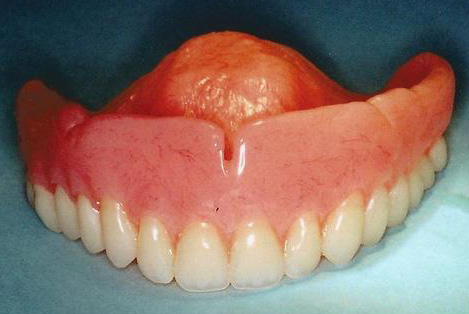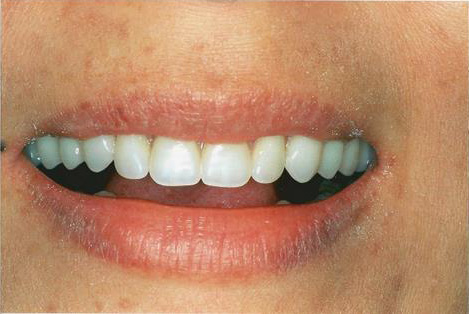If you’ve lost all of your natural teeth, whether from periodontal disease, tooth decay or injury, complete dentures can replace your missing teeth and your smile. Replacing missing teeth will benefit your appearance and your health. Without support from the denture, facial muscles sag, making a person look older. Youll be able to eat and speak .
Even if you wear full dentures, you still must take good care of your mouth. Brush your gums, tongue and palate every morning with a soft-bristled brush before you insert your dentures to stimulate circulation in your tissues and help remove plaque.


Frequently Asked Questions about Dentures:
Immediate dentures?
Complete dentures are called "conventional" or "immediate" according to when they are made and when they are inserted into the mouth. Immediate dentures are inserted immediately after the removal of the remaining teeth. To make this possible, the dentist takes measurements and makes the models of the patient's jaws during a preliminary visit.
An advantage of immediate dentures is that the wearer does not have to be without teeth during the healing period. However, bones and gums can shrink over time, especially during the period of healing in the first six months after the removal of teeth. When gums shrink, immediate dentures may require rebasing or relining to fit properly. A conventional denture can then be made once the tissues have healed. Healing may take at least 6-8 weeks.
- What is an overdenture?
A removable denture that fits over a small number of remaining natural teeth or implants. The natural teeth must be prepared to provide stability and support for the denture. Your dentist can determine if an overdenture would be suitable for you.
- Will I be able to eat with my dentures?
Eating will take a little practice. Start with soft foods cut into small pieces. Chew slowly using both sides of your mouth at the same time to prevent the dentures from tipping. As you become accustomed to chewing, add other foods until you return to your normal diet.
- Will dentures change how I speak?
Pronouncing certain words may require practice. Reading out loud and repeating troublesome words will help. If your dentures "click" while you're talking, speak more slowly. You may find that your dentures occasionally slip when you laugh, cough or smile. Reposition the dentures by gently biting down and swallowing. If a speaking problem persists, consult your dentist.
- How long should I wear my dentures?
Your dentist will provide instructions about how long dentures should be kept in place. During the first few days, you may be advised to wear them most of the time, including while you sleep. After the initial adjustment period, you may be instructed to remove the dentures before going to bed. This allows gum tissues to rest and promotes oral health. Generally, it is not desirable that the tissues be constantly covered by denture material.
- How do I take care of my dentures?
- When you are not wearing them, store your dentures away from children and pets.
- Like natural teeth, dentures must be brushed daily to remove food deposits and plaque.
- Avoid using bleach / rough powder as this may whiten the pink portion of the denture.
- Brush every surface gently to avoid damage.
- When they are not worn, dentures should be placed in a denture cleanser soaking solution or in water.
- Ultrasonic cleaners are used to clean dentures for tough stains by dentist.
- Will my dentures need to be replaced?
Dentures may need to be replaced if they become loose and the teeth show signs of significant wear. Dentures become loose because a mouth naturally changes with age. Bone and gum ridges can recede or shrink, causing jaws to align differently. Loose dentures can cause health problems, including sores and infections. A loose denture also makes chewing more difficult and may change your facial features. It's important to replace worn or poorly-fitting dentures before they cause problems.
With regular professional care, a positive attitude and persistence, you can become one of the millions of people who wear their dentures with a smile.
|



